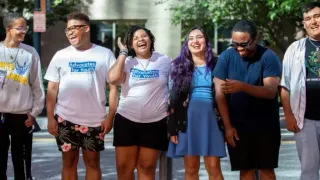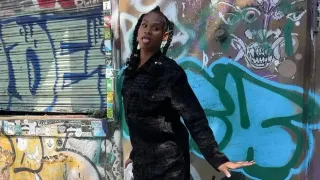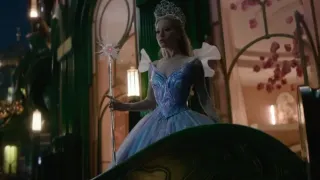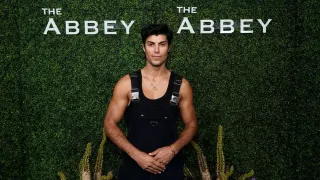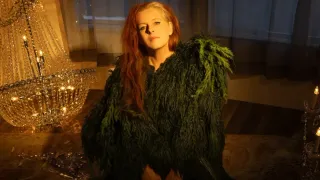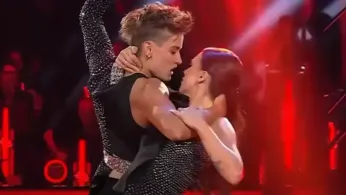
4 hours ago
Poland's "Dancing with the Stars" Makes History with First Same-Sex Dance Pairing
READ TIME: 3 MIN.
Poland’s popular television competition, "Dancing with the Stars" (Taniec z Gwiazdami), has broken new ground this season by pairing Olympic cyclist Marta Jaskulska with professional dancer Zofia Nowak, forming the show’s first-ever same-sex couple. The bold casting choice comes amid ongoing debates about LGBTQ+ rights and visibility in Poland, a country where queer representation on mainstream entertainment platforms remains rare.
The announcement was met with both celebration and controversy. Advocates praise the move as a vital step toward inclusion, while critics, including some conservative public figures, argue it challenges traditional values. On social media, the hashtag #TaniecZRównością (#DanceWithEquality) quickly began trending, with thousands expressing their support for the pair.
Poland has consistently ranked low in terms of LGBTQ+ rights among European Union nations, with activists often highlighting the lack of legal protections and the influence of anti-LGBTQ+ rhetoric in public discourse. Against this backdrop, Jaskulska’s appearance with Nowak is viewed by many as a courageous act that challenges prejudices and opens the door for broader acceptance.
“Visibility matters,” said Witold Klaus, a prominent LGBTQ+ advocate in Poland, in an interview following the show’s premiere. “When people see queer individuals on their screens, living authentically and pursuing their passions, it helps dispel harmful stereotypes and fosters empathy”.
Over the past year, Polish lawmakers have debated legislation to extend hate crime protections to include sexual orientation and gender identity, signaling a possible shift toward greater legal support for queer citizens. While progress is slow, cultural milestones like the same-sex dance pairing on national television serve as powerful symbols of change.
Poland’s decision follows similar moves in other countries, where dance competition shows have begun to embrace diversity and challenge heteronormative traditions. In the UK, "Strictly Come Dancing" featured its first same-sex couple in 2020, while the US version of "Dancing with the Stars" has increasingly highlighted LGBTQ+ contestants and allies.
At the recent US season 32 premiere, co-host Julianne Hough described dance as “the greatest unifier,” expressing her admiration for LGBTQ+ people and urging viewers to celebrate diversity. Judge Carrie Ann Inaba reflected on the evolution of ballroom dancing, stating, “It’s really wonderful that they have opened themselves up to be so inclusive”.
In this international context, Poland’s step is especially significant given the country’s conservative social climate. The move is seen as an effort to align with growing global standards of inclusion and to signal support for marginalized communities.
The Polish LGBTQ+ community has largely embraced the development, viewing it as an affirmation of their place in society. “It’s a moment of pride,” said Anna Grodzka, Poland’s first openly transgender Member of Parliament, in a statement released by the organization Lambda Warszawa. “Representation is not just symbolic—it has real consequences for how we are seen and treated in everyday life.”
Some activists caution that while media visibility is important, it must be matched by substantive policy changes. “We need to ensure that these moments translate into tangible improvements for LGBTQ+ people, including legal protections, anti-discrimination measures, and access to health care,” said activist Krzysztof Śmiszek.
Despite the positive response from many, backlash was swift from certain quarters. Conservative activist Kaja Godek, known for her anti-LGBTQ+ rhetoric, criticized the show’s producers for “promoting non-traditional partnerships” on national television. Her remarks have been widely condemned by both international and domestic human rights organizations.
Poland’s government, under pressure from grassroots campaigns and international observers, has recently approved plans to strengthen hate crime laws and include protections for sexual orientation and gender identity. This legislative momentum, coupled with high-profile media moments, suggests a shifting landscape for LGBTQ+ rights in Poland.
As Jaskulska and Nowak take to the dance floor each week, their partnership is closely watched by audiences and advocates alike. The visibility they bring serves as both inspiration and a litmus test for just how far Polish society is willing to go in embracing diversity.
LGBTQ+ organizations hope that this breakthrough will encourage other media producers to include queer stories and characters, not only in entertainment but also in news, advertising, and public service programming. The ultimate goal, say activists, is to move beyond symbolic gestures to create lasting institutional change.
For now, the pair’s graceful performances are not only a testament to their talent but also a powerful statement of resilience and hope. As the season unfolds, they remain at the center of a national conversation about equality, acceptance, and the power of representation.
